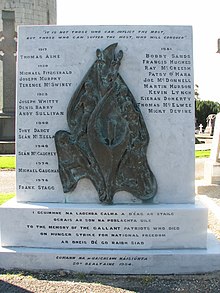Joe Murphy (Irish republican)
Joe Murphy | |
|---|---|
| Born | Joseph Patrick Murphy 10 May 1895 |
| Died | 25 October 1920 (aged 25) Cork Gaol, County Cork, Ireland |
| Resting place | Saint Finbarr's Cemetery, Cork, Ireland |
| Nationality | Irish American |
| Known for | Irish Republican Army prisoner who died on hunger strike |
Joseph Patrick Murphy (Irish: Seosamh Ó Murchú; 10 May 1895 – 25 October 1920) was a member of the Irish Republican Army who died on hunger strike at Cork Gaol in 1920 during the Irish War of Independence.[citation needed]
Background[]
Joe Murphy was born in Lynn, Massachusetts in the United States of America[1] on 10 May 1895[2][3] the son of Irish parents, Timothy Murphy and Nora O'Brien, who subsequently returned home to their native Cork City when Joe was a young child. He was educated at Togher National School and on leaving school was employed by Cork County Council.[4]
He had a keen interest in the Gaelic sports of hurling, Gaelic football and road bowling.[citation needed]
Irish Republican Actions, Hunger Strike & Death[]
Murphy joined the Irish Volunteers in 1917 and became a member of H Company, 2nd Battalion, Cork No.1 Brigade of which he was an active member. He was involved in numerous attacks on British police and military posts including a well publicised attack on Farran police barracks a few miles west of Cork city.
Murphy was arrested by British forces on 15 July 1920 on suspicion of being in possession of explosives and was imprisoned in Cork County Gaol.[5]Murphy faced a Military Tribunal but was not convicted of any crime but was returned to Cork Gaol.[6] With a large group of prisoners at the gaol he commenced a hunger strike in conjunction with the Lord Mayor of Cork Terence McSwiney. Another Cork hunger striker Michael Fitzgerald also died.
Joe Murphy died after seventy-six days without food on 25 October 1920 and was buried in the republican plot at St. Finbarr's Cemetery, Cork with full military honors.[7] His funeral cortege was led by Volunteers carrying wreaths and the American Flag.[8]Joe Murphy is buried next to fellow hunger striker Terence MacSwiney and the assassinated Lord Mayor of Cork Tomás Mac Curtain.[9]

Honors/Awards[]
In the late 1940s Cork City Council built a large new housing estate at Ballyphehane. Most of the roads in the new estate were named after prominent figures in the Irish War of Independence including local figures and one of these thoroughfares was named Joe Murphy Road in his honour as it was quite close to his home at Lower Pouladuff Road.
He was posthumously awarded the Service (1917-1921) Medal with Bar by the Lord Mayor of Cork in respect of his service during the War of Independence, some 99 years after his death at a ceremony in Cork's City Hall attended by members of the defence forces and his family on 9 May 2019.
References[]
- Cork Jail Memorial Souvenir (pamphlet), 1948, Cló na Laoí (The Lee Press), Cork.
- ^ Joseph Murphy Dies of 76 Days' Hunger Strike, the Second Prisoner to Succumb in Cork Jail, New York Times, 26 October 1920
- ^ "Massachusetts Births, 1841-1915". FamilySearch. Retrieved 26 October 2020.
- ^ Massachusetts Vital Records, 1911–1915. New England Historic Genealogical Society, Boston, Massachusetts.
- ^ Flynn, Barry Pawns in the Game, The Collins Press, Cork, 2011, ISBN 9781848891166, pg 57
- ^ Flynn, pg 56
- ^ Flynn, pg 57
- ^ Barry, Denis, The Forgotten Commandant, The Collins Press, Cork, 2010, ISBN 9781848890299, pg 65
- ^ Flynn, pg57
- ^ Barry pg 69.
- 1895 births
- 1920 deaths
- Irish Republican Army (1919–1922) members
- People from County Cork
- People from Lynn, Massachusetts
- Irish prisoners who died on hunger strike